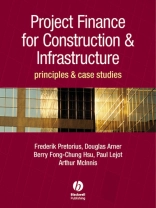This is a self-contained text on the logic and institutions of project finance, supplemented by a series of project finance case studies illustrating applications in different economic environments, across different jurisdictions and at different stages of development.
It will introduce an analytical framework drawing on applied institutional economics that includes and concentrates primarily on an analysis of the institutional logic behind generic project finance arrangements.
The application of the institutional framework will be demonstrated with project cases from Hong Kong, Thailand, India, Europe and Azerbaijan – each at different stages of development. While each project case will have a general theme and will highlight aspects of interest to built environment professionals, it will primarily be used to illustrate one or more specific PF/PFI principle.
Table of Content
Preface vi
Acknowledgements ix
About the Authors x
1 The Nature of Project Finance 1
1.1 The world of projects today 3
1.2 Corporations, finance and projects: important concepts 5
1.3 The project company business model 12
1.4 The project cycle 21
1.5 System concepts and the project company 29
1.6 Plan of the book 39
Key concepts 42
2 Complex Transactions 43
2.1 Transactions, the cost of transactions, transaction cost economics, and projects 44
2.2 A more formal approach to disaggregation of transactions 51
2.3 The influence of agency on transaction costs — agency costs 58
2.4 Corporate finance context 64
2.5 Incentive conflicts in corporate finance 69
2.6 Transaction costs and agency — theoretic logic of the project finance model 75
Key concepts 78
Appendix 2.1 Comparison of long-term debt instruments 79
A2.1.1 Syndicated loans 80
A2.1.2 International bonds 86
3 Financial Evaluation 93
3.1 Valuation and the project company 94
3.2 Valuation and the project company as a single-asset business 111
3.3 Capital budgeting decisions 135
Key concepts 149
4 Managing Risk in Project Finance Transactions 150
4.1 The project cycle revisited 152
4.2 Risk management approaches 155
4.3 The project company and risk identification 169
4.4 Risks in the construction phase 188
4.5 The institutional environment and risk 195
4.6 Risk management and project lenders 203
Key concepts 214
5 Continuing Evolution: from PF to PFI, PPP and beyond 216
5.1 Introduction 216
5.2 PFI origins 219
5.3 Types of PFI 221
5.4 PFI features 223
5.5 Procurement process principles 225
5.6 Contract and control structure 231
5.7 The special purpose or project vehicle and financing 232
5.8 PFI/PPP and rational privatisation 233
5.9 Risk management 234
5.10 Financial risk in PFI and PPPs 239
5.11 Challenges for PFI and PPP and the responses 239
5.12 The lessons 242
Key concepts 244
6 The Relevance of Sound Demand in Infrastructure Project Finance: the Sydney Cross City Tunnel 245
6.1 Infrastructure fi nance: the Sydney Cross City Tunnel 245
6.2 History of the CCT project 246
6.3 Cheung Kong Infrastructure Holdings Limited 252
6.4 The bidding process 256
6.5 Valuing the project 257
6.6 Assessing project risks 261
6.7 Capital structure 262
6.8 Completion of the deal 266
6.9 Project outcomes 278
7 Financial Structure and Infrastructure Project Finance: the Hong Kong Western Harbour Crossing 280
7.1 Refinancing the Western Harbour Crossing, Hong Kong 280
7.2 History of the Western Harbour Crossing 281
7.3 Valuation of the project 302
8 Institutional Risks and Infrastructure Project Finance: the Dabhol Power Project 308
8.1 Dabhol Power Project 309
8.2 Development of the Dabhol Power Project 312
8.3 Power purchase agreement 314
8.4 Epilogue 321
8.5 Analysis 321
9 Extreme Complexity in Transacting: public private partnerships at work in the London Underground 324
9.1 Public private partnership: London Underground 324
9.2 Two countries, two systems 325
9.3 Public private partnership 328
9.4 Endnote 346
References 348
Index 354
About the author
Frederik Pretorius and Berry Hsu, Department of Real Estate and Construction, University of Hong Kong.
Paul Lejot and Douglas Arner, Faculty of Law, University of Hong Kong.
Arthur Mc Innis, Faculty of Law, City University of Hong Kong.












